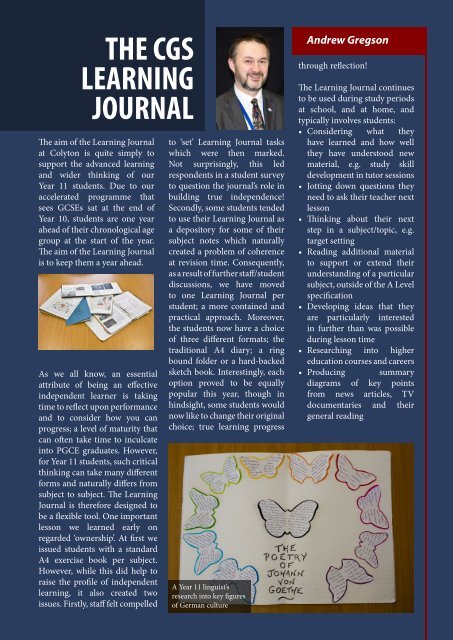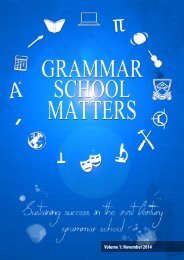Volume 1: November 2014
You also want an ePaper? Increase the reach of your titles
YUMPU automatically turns print PDFs into web optimized ePapers that Google loves.
THE CGS<br />
LEARNING<br />
JOURNAL<br />
The aim of the Learning Journal<br />
at Colyton is quite simply to<br />
support the advanced learning<br />
and wider thinking of our<br />
Year 11 students. Due to our<br />
accelerated programme that<br />
sees GCSEs sat at the end of<br />
Year 10, students are one year<br />
ahead of their chronological age<br />
group at the start of the year.<br />
The aim of the Learning Journal<br />
is to keep them a year ahead.<br />
As we all know, an essential<br />
attribute of being an effective<br />
independent learner is taking<br />
time to reflect upon performance<br />
and to consider how you can<br />
progress; a level of maturity that<br />
can often take time to inculcate<br />
into PGCE graduates. However,<br />
for Year 11 students, such critical<br />
thinking can take many different<br />
forms and naturally differs from<br />
subject to subject. The Learning<br />
Journal is therefore designed to<br />
be a flexible tool. One important<br />
lesson we learned early on<br />
regarded ‘ownership’. At first we<br />
issued students with a standard<br />
A4 exercise book per subject.<br />
However, while this did help to<br />
raise the profile of independent<br />
learning, it also created two<br />
issues. Firstly, staff felt compelled<br />
to ‘set’ Learning Journal tasks<br />
which were then marked.<br />
Not surprisingly, this led<br />
respondents in a student survey<br />
to question the journal’s role in<br />
building true independence!<br />
Secondly, some students tended<br />
to use their Learning Journal as<br />
a depository for some of their<br />
subject notes which naturally<br />
created a problem of coherence<br />
at revision time. Consequently,<br />
as a result of further staff/student<br />
discussions, we have moved<br />
to one Learning Journal per<br />
student; a more contained and<br />
practical approach. Moreover,<br />
the students now have a choice<br />
of three different formats; the<br />
traditional A4 diary; a ring<br />
bound folder or a hard-backed<br />
sketch book. Interestingly, each<br />
option proved to be equally<br />
popular this year, though in<br />
hindsight, some students would<br />
now like to change their original<br />
choice; true learning progress<br />
A Year 11 linguist’s<br />
research into key figures<br />
of German culture<br />
Andrew Gregson<br />
through reflection!<br />
The Learning Journal continues<br />
to be used during study periods<br />
at school, and at home, and<br />
typically involves students:<br />
• Considering what they<br />
have learned and how well<br />
they have understood new<br />
material, e.g. study skill<br />
development in tutor sessions<br />
• Jotting down questions they<br />
need to ask their teacher next<br />
lesson<br />
• Thinking about their next<br />
step in a subject/topic, e.g.<br />
target setting<br />
• Reading additional material<br />
to support or extend their<br />
understanding of a particular<br />
subject, outside of the A Level<br />
specification<br />
• Developing ideas that they<br />
are particularly interested<br />
in further than was possible<br />
during lesson time<br />
• Researching into higher<br />
education courses and careers<br />
• Producing summary<br />
diagrams of key points<br />
from news articles, TV<br />
documentaries and their<br />
general reading<br />
A student’s work experience<br />
reflections and self-taught material on<br />
photography.<br />
This approach to recording<br />
reflections helps them to keep tabs<br />
on how their independent study<br />
skills are developing throughout<br />
the year. As a result, they start to<br />
gain a better awareness of what<br />
types of activities work best for<br />
them and which ones they need<br />
to target for improvement. This<br />
record can therefore act as a<br />
powerful source of information<br />
in discussions with tutors and<br />
the head of sixth form. A ‘typical’<br />
reflection often includes:<br />
• How they have used their<br />
study time<br />
• What they have learnt from<br />
the experience<br />
• Which actions should now be<br />
prioritised as a next step<br />
Not surprisingly, Year 11<br />
students initially need support<br />
in developing this kind of<br />
approach; hence subject staff<br />
provide specific guidance to<br />
get them started. However, this<br />
input is deliberately limited. The<br />
Learning Journal is their tool.<br />
The only assessment use made<br />
of it by staff is at the end of the<br />
year when tutors review it as part<br />
of the criteria for our Year 11<br />
Independent Learning Award.<br />
In conclusion, for the student<br />
there is no set way to use the<br />
Learning Journal as it depends<br />
upon their interests, subjects<br />
and preferred learning style. The<br />
aim, however, is clear; to develop<br />
a mature awareness of learning<br />
skills that moves our students on<br />
from how they worked in lower<br />
school, thereby preparing them<br />
for the very different demands of<br />
A-level and university learning,<br />
especially regarding contextual<br />
reading. For many it is a real<br />
challenge to engage in this kind<br />
of wider learning but, in our<br />
view, the long term gains in terms<br />
of maturity, critical awareness,<br />
self-motivation and confidence<br />
make the effort well worthwhile.<br />
Certainly, those who criticise<br />
grammar schools as mere exams<br />
factories should take a look at<br />
our Learning Journal. Then they<br />
may appreciate how we truly<br />
strive to prepare our young<br />
people to succeed in life, not just<br />
with UCAS.<br />
Another example of a student’s research that goes beyond<br />
any taught A-level specification – the development of sign<br />
language – and an English Department’s extension task<br />
focused on First World War poetry.



